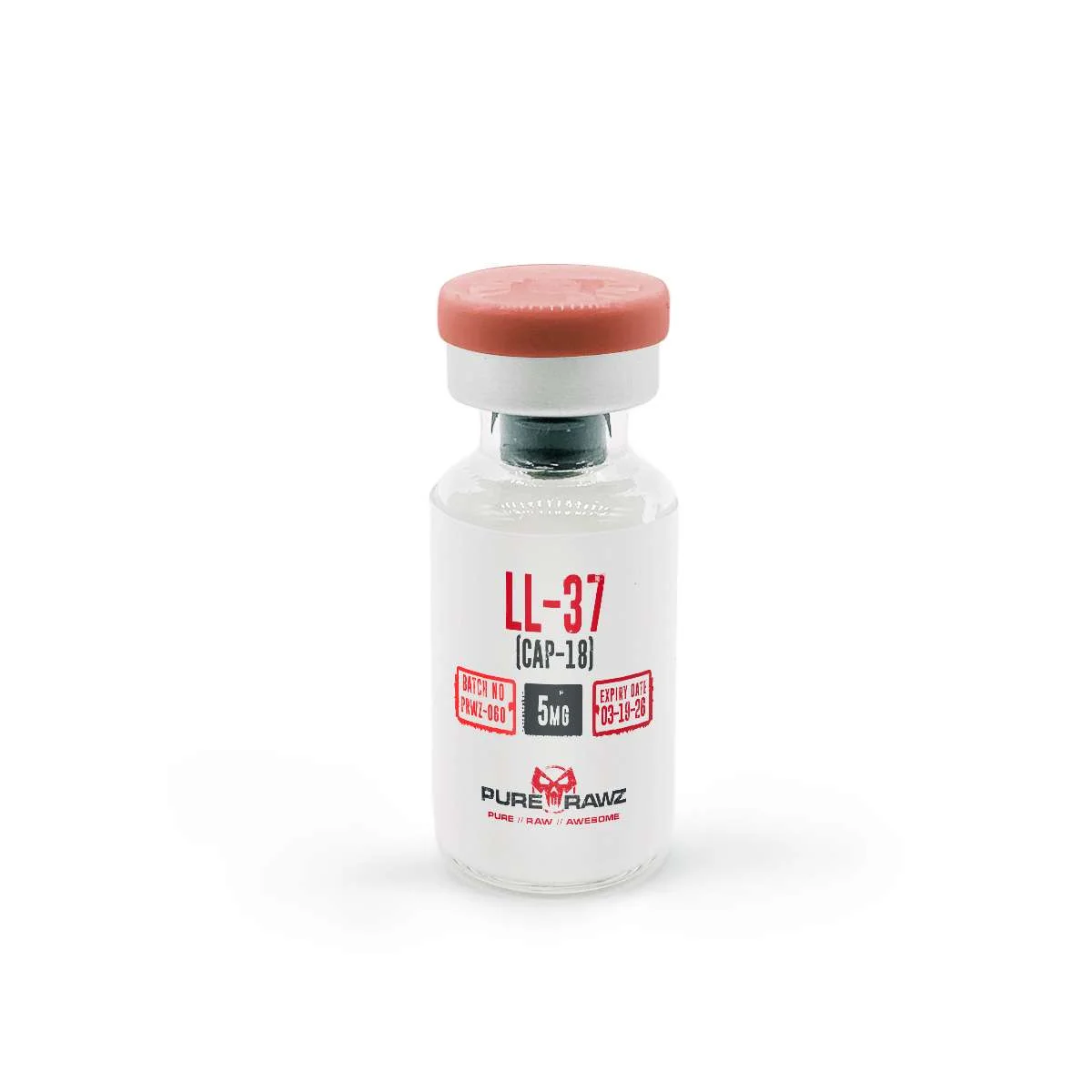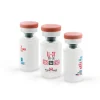LL-37 (CAP-18)
$101.34
Earn 101 points upon purchasing this product.
For optimal stability and integrity, we recommend reconstituting all peptides with bacteriostatic water, as reliability cannot be guaranteed with alternative solutions.
- 1st and 3rd Party Verified for 99% Purity
- Free Shipping on Orders Over $100+
Enjoy 24/7 customer support, 1st & 3rd party verified 99% purity, and free shipping on orders over $100!
Description
What is LL-37?
LL-37 is a type of antimicrobial peptide, which means it helps fight bacteria, viruses, and fungi. It is a peptide found in the human body and is part of the immune system. Scientists study LL-37 because it has many potential health benefits.
| Product Name | LL-37 |
| CAS | N/A |
| Molar Mass | 4492.06 g/mol |
| Chemical Formula | C205H340N60O53 |
| IUPAC Name | N/A |
| Synonyms | CAP-18 |
How does LL-37 work?
- LL-37 is a natural antimicrobial peptide that helps the body defend against harmful microorganisms.
- It may work by breaking down the protective outer layers of bacteria and viruses, making them weaker or destroying them completely.
- By disrupting the outer structure of these microbes, LL-37 may make it easier for the immune system to eliminate them.
- In addition to its antimicrobial effects, LL-37 plays a role in reducing inflammation, which may help prevent excessive immune responses that could damage healthy tissues.
- It supports wound healing by promoting the growth of new skin cells and helping damaged tissues recover faster.
- Research suggests that LL-37 may also encourage the body to form new blood vessels, improving blood circulation to injured areas.
- This process, known as angiogenesis, helps deliver oxygen and nutrients to tissues. This process helps in healing and regeneration.
What are the potential benefits of LL-37?
Scientists are studying LL-37 for its possible role in:
- Fighting infections
- Reducing inflammation
- Healing wounds
- Supporting immune health
- Encouraging blood vessel growth
Note: This product is strictly intended for research purposes and is not approved for human use.
LL-37 and Lung Diseases
Research suggests that LL-37 may help with lung diseases like pneumonia and chronic obstructive pulmonary disease (COPD). It may have antimicrobial properties in the lungs and could reduce inflammation and mucus buildup. This could help make breathing easier for people with lung conditions.
LL-37 and Inflammatory Diseases
Inflammation happens when the body tries to heal itself. Excessive inflammation may cause problems like autoimmune diseases. LL-37 may help regulate and modulate immune responses.
LL-37 and Arthritis
Arthritis is a condition that causes joint pain and swelling. Some research shows that LL-37 has been studied for its potential role in protecting joint tissues and modulating pain responses. It could also help slow down joint damage in conditions like rheumatoid arthritis.
LL-37 and Blood Vessel Growth
LL-37 may help the body grow new blood vessels. This process is called angiogenesis, which is important for wound healing and tissue repair. Some scientists are investigating whether LL-37 could be useful in conditions where blood flow is reduced, such as diabetic wounds.
Where can you find LL-37 online for research purposes?
If you want to buy LL-37 for research purposes, PureRawz is a reliable option.
We provide reference materials with every product we offer. Each of our products comes with an independent, third-party-issued Certificate of Analysis for identification, purity, and concentration.
Is LL-37 legal?
LL-37 is not approved as a drug by health authorities like the FDA or EMA. However, it is available for scientific research. It cannot be marketed or sold for medical use in many countries. Always check the local laws of your particular region before purchasing it.
FAQs
Is LL-37 natural?
LL-37 is naturally found in the human body as a part of the immune system.
How is LL-37 used in research?
Scientists study LL-37 by testing it on cells and animals to see how it works in different conditions.
Is LL-37 safe for human use?
No, LL-37 is not safe for human or veterinary use. It is strictly intended for research purposes only.
How should this product be stored?
It is best to store this product in a cool, dry place away from direct sunlight. This helps extend the shelf life of the product.
Disclaimer
This information is for educational purposes only and not medical advice. Products are for research use only. Research must follow IRB or IACUC guidelines. Verify information independently before purchasing. By ordering, you agree to our Terms and Conditions. If you are not 100% satisfied with the product you received, please contact us at support@purerawz.co
ATTENTION: All our products are for LABORATORY AND RESEARCH PURPOSES ONLY, not for veterinary or human usage.







Nathan Andrews –
What a great product , I am ordering more right now !
Anonymous –
Thank you once again. This saved my squirrel’s life. I am a loyal customer, without a doubt.
Dwight –
I apologize for the late review as I was waiting for results after using this product. It’s quite amazing, it really worked well. I can say that this product is hundred percent legit and the quality is superb.
Harvey Wisoky –
The quality is absolute!
Anonymous –
Excellent customer service!
Billy Richardson –
Amazing results! The quality is top-notch, and for its price, it’s really worth it!
Kenneth –
It worked very well in my research. I will definitely buy again!
Mateo Wallace –
Very happy with what I received.
Bertram Brown –
The way these peptides preserve is very cool. Very helpful to protect against any bacterial and viral ocular infections.
Raheel –
Significantly resistant to proteolytic degradation.
garryvalenciano –
The quality and effectiveness exceeded my expectations.